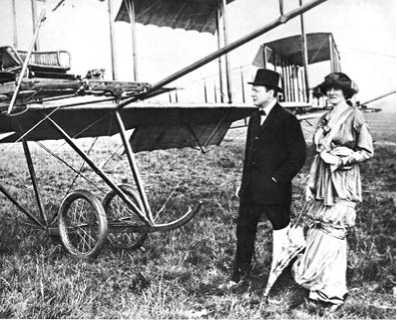“We remembered that it was upon the advice of the Air Ministry that Mr. Baldwin had made the speech which produced so great an impression in 1933 when he said that there was really no defence. ‘The bomber will always get through.’We had therefore no confidence in any Air Ministry departmental committee.

"For good luck before I started I put your locket on.” WSC and Clementine with a flying machine at Hendon, 1914.
Churchill was a pilot trainee until a series of near-misses caused him to give it up at the urgent request of his wife. As a young MP, he was a leading proponent of the Air Service as a major branch of the military. As Sir Martin Gilbert has noted, Churchill in 1909 was already urging his colleagues in the British government “to make contact with the Wright Brothers in the United States, in order to be at the cutting edge of the science of aviation”.45 46
As First Lord of the Admiralty, Churchill established the Royal Naval Air Service, which played important roles both in attacking enemy ground formations near Dunkirk and in attacks on German naval shipping. Before war ended he was already urging Anglo-French cooperation in the design and manufacture of long-distance bombers, which he felt would be much more effective than the ponderous, slow-moving Zeppelins that had threatened London.
As Secretary of State for Air from 1919 to 1921, Churchill argued for adequate funding for the fledgling Royal Air Force, which atrophied in the euphoria following the peace of Versailles. He had no compunction against the use of bombing to serve a greater good: during his ministry he authorised bombing Sinn Fein terrorists in Ireland, insurgents in Iraq, and Arabs who attacked the Jewish town of Petakh Tikvah in Palestine.47
During the 1930s, when his lonely voice warned against the rise of Nazi Germany, the military aspect that most concerned Churchill was the air. Repeatedly he harangued the governments of those years, to bolster and expand the Royal Air Force, particularly its fighter squadrons. (See also Chapter 17.) Belatedly and insufficiently equipped as it was, the RAF prevented a German invasion in 1940.
Churchill’s pronouncements on air bombardment date from before World War I, when very few of his contemporaries were thinking so far ahead as he. But most of the quotations here are from the Thirties, when the question of air defence was paramount. Unlike Prime Minister Stanley Baldwin, who was resigned to the likelihood of devastating bomber attacks should war ever occur, Churchill argued for defence as well as offence, and came close to advocating what we later knew as radar and surface-to-air missiles. Typically, he felt the frustration of those who saw only reasons for doing nothing. “There is no use gaping vacuously on the problems of the air,” he said in 1933. He was for solutions: “guns which fire upwards” (1914), and other methods “to enable the earth to control the air” (1935).




 World History
World History









